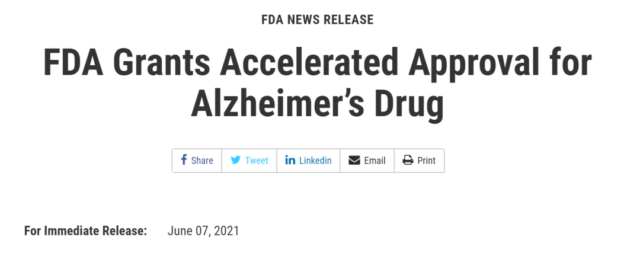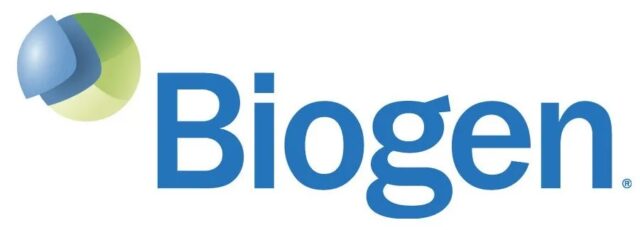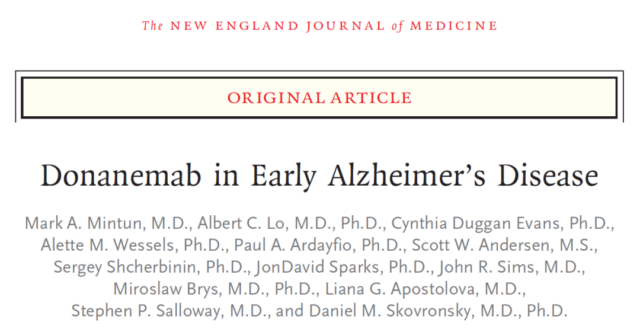Exciting: Alzheimer disease ushered in the first new drug in 18 years
- Normal Liver Cells Found to Promote Cancer Metastasis to the Liver
- Nearly 80% Complete Remission: Breakthrough in ADC Anti-Tumor Treatment
- Vaccination Against Common Diseases May Prevent Dementia!
- New Alzheimer’s Disease (AD) Diagnosis and Staging Criteria
- Breakthrough in Alzheimer’s Disease: New Nasal Spray Halts Cognitive Decline by Targeting Toxic Protein
- Can the Tap Water at the Paris Olympics be Drunk Directly?
Exciting: Alzheimer’s disease ushered in the first new drug in 18 years, FDA approved Aducanumab to market
Exciting: Alzheimer’s disease ushered in the first new drug in 18 years. On June 7, 2021, FDA announced the accelerated approval of Biogen’s monoclonal antibody aducanumab for the treatment of Alzheimer’s induced mild cognitive impairment (MCI) and mild Alzheimer’s disease. This is the first new drug approved by the FDA for the treatment of Alzheimer’s disease since 2003, and the first drug that can prevent the progression of the disease.
Before 2003, the FDA approved five drugs for the treatment of Alzheimer’s disease, but these drugs can only relieve symptoms and cannot prevent the progression of Alzheimer’s disease.

Alzheimer’s disease
Alzheimer’s disease (AD), commonly known as “Alzheimer’s disease”, is a serious neurodegenerative disease. Patients usually suffer from memory decline and weakened learning ability, accompanied by emotional regulation. Obstacles and loss of athletic ability greatly affect the development of individuals, families and even society.
Currently, about 50 million people worldwide suffer from Alzheimer’s disease. As the average life expectancy of human beings increases and the aging society intensifies, the prevalence of Alzheimer’s disease is also rising. It is estimated that by 2050, Alzheimer’s patients will increase to more than 150 million.
Regrettably, the cause of Alzheimer’s disease is complex, and the scientific community has not yet deciphered the specific mechanism of Alzheimer’s disease. The mainstream view is that the cause is β-amyloid protein (Aβ) and Tau amyloid protein deposition. Cause a large number of neuron deaths.
However, in recent years, clinical trials of Alzheimer’s drugs targeting these two targets have been smashed. In the entire field of new drug research and development, perhaps no one can be as ups and downs as the field of Alzheimer’s.
The most ups and downs among them is the drug candidate aducanumab developed by Biogen and Eisai for Alzheimer’s disease.
Long Road before approval
In November 2007, Biogen introduced aducanumab, a monoclonal antibody candidate for the treatment of early Alzheimer’s disease from Neurimmune, which can selectively interact with β-starch in the brains of Alzheimer’s patients. Aβ-like protein (Aβ) deposits and binds, and then activates the immune system to clear the Aβ deposit protein in the brain.
Since October 2017, Biogen and Eisai have cooperated on the development and commercialization of this monoclonal antibody globally.
However, on March 21, 2019, Biogen announced the termination of the two global phase III clinical trials of aducanumab code-named ENGAGE and EMERGE. The independent committee assessed that it is likely to be difficult to achieve the expected efficacy. As soon as the news came out, Biogen’s stock price plummeted 27%, and its market value shrank by US$15 billion.
Unexpectedly, on October 22, 2019, Biojian announced that after analyzing a larger data set, its medical data statistician found that aducanumab had a significant effect compared to placebo. So re-submitted the “Biologics License Application” (BLA) application to the FDA. Affected by this news, Biogen’s share price soared 40%.
However, this is not over yet.
On November 6, 2020, the FDA’s Peripheral and Central Nervous System Drug Advisory Committee re-applied for Biogen, and most members voted against it.
In April 2021, Caleb Alexander, Scott Emerson, and Aaron Kesselheim, three members of the US FDA’s Peripheral and Central Nervous System Drug Advisory Committee, published an article in the JAMA journal criticizing aducanumab, saying that Biogen is shooting arrows first and then drawing targets.
The future of aducanumab, which has come back from the dead, is still uncertain. The outside world is still full of doubts about whether the FDA will approve the Alzheimer’s drug candidate aducanumab developed by Biogen and Eisai, which also makes it the most watched drug development story in 2021 ( one).
The first new drug for Alzheimer’s disease approved by the FDA in 18 years
On June 7th, local time in the United States, the FDA announced the accelerated approval of aducanumab developed by Biogen to treat patients with Alzheimer’s disease. Aducanumab has also become the first new treatment approved for Alzheimer’s disease since 2003.

Failure and hope coexist
In September 2020, Genentech, a Roche company, and its partner AC Immune jointly announced that its in-development antibody drug targeting Tau amyloid, Semorinemab, missed the primary endpoint and two secondary endpoints in the Phase 2 clinical trial. On the day the results were announced, AC Immune’s stock price fell 42%. This failure was named by FiercePharma as one of the top ten failed clinical studies in the world in 2020.
On March 13, 2021, Eli Lilly and Company published a Phase 2 clinical trial paper entitled: Donanemab in Early Alzheimer’s Disease in the New England Journal of Medicine (NEJM), the head of the four major international medical journals.
The Donanemab monoclonal antibody targeting β-amyloid (Aβ) developed by Eli Lilly reached the primary endpoint in a phase 2 clinical trial, and the deposition of β-amyloid (Aβ) and Tau amyloid in the patient’s brain was achieved. Effectively clear.

Donanemab is a monoclonal antibody developed by Eli Lilly and Company, which can target and bind β-amyloid (Aβ) modified by pyroglutamate at position 2 of the N-terminal to quickly and completely remove amyloid deposits.
In this phase 2 clinical trial involving 257 patients with Alzheimer’s disease, 131 received Donanemab monoclonal antibody treatment developed by Eli Lilly and the remaining 126 received placebo treatment for 72 weeks.
The test results showed that the β-amyloid (Aβ) and Tau amyloid deposits in the patient’s brain were effectively eliminated, and Donanemab monoclonal antibody reached its primary endpoint. In terms of cognition and daily function, these symptomatic early Alz The rate of decline in the Integrated Measurement of Cognition and Daily Functioning (iADRS) of patients with Hemer’s disease slowed by 32%.
Overall, in patients with early Alzheimer’s disease, Donanemab monoclonal antibody treatment can significantly slow the decline of patients’ cognitive and daily function, although the secondary endpoint has mixed results.
Although the field of Alzheimer’s disease has failed frequently, scientists are now finding new hope from these failures.
(source:internet, reference only)
Disclaimer of medicaltrend.org
Important Note: The information provided is for informational purposes only and should not be considered as medical advice.



